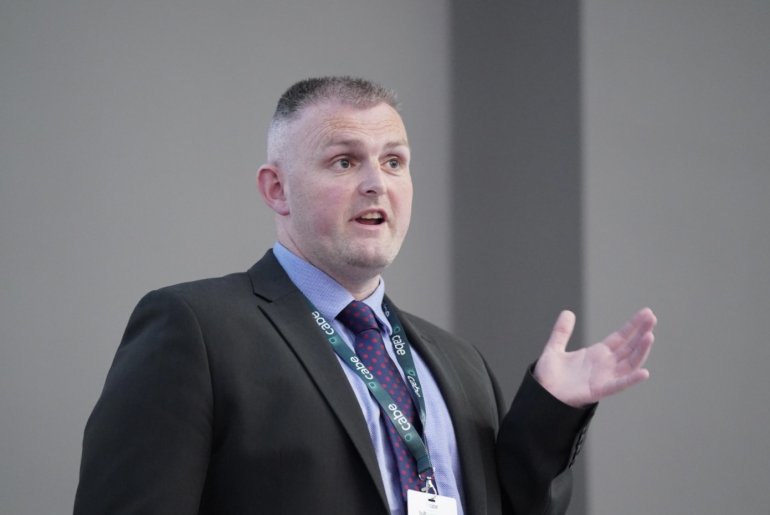Deputy Chief Inspector of Buildings Delivers Keynote at First Built Environment Conference

The inaugural Built Environment England Technical Conference took place earlier this week and featured a host of impressive speakers, including the recently appointed Deputy Chief Inspector of Buildings, Chris Griffin-McTiernan.
The University of Salford hosted the first of a regional series of events for 2023, and welcomed more than 100 delegates for a packed speaker programme. The conference addressed the themes of Performance, Compliance and Safety and investigated key areas of the construction industry including the challenges of the new duty-holder regime and the journey to zero carbon.
As a representative from the Building Safety Regulator (BSR), Chris’ keynote discussed the latest updates on the establishment of the new BSR and expanded on the new Building Regulatory Regime, including dutyholders’ responsibilities for those responsible for Higher Risk Buildings (HRBs) and registration of the Building Control profession.
"There will be no automatic registrations for building inspectors. Everyone will have to demonstrate their competence,” Chris informed delegates.
Session one on ‘Bringing the Dutyholding Regime and Competence to Life’ saw Jon Vanstone, Chair of the Interim Competence Committee, warn the audience that time is running out: “the industry needs to make sure it's on the right side of progress”, he said.
"If you make a choice about a construction product, you are a designer & now have design liability.
— Chartered ABE (@cbuilde) June 20, 2023
This has real consequences; designers need to demonstrate competence in their understanding of construction products."
- Hanna Clarke, Digital and Policy Manager @CPA_Tweets pic.twitter.com/Qvv84FsEwl
CABE’s Technical Director, Richard Harral, added: “Competence relates to organisations as well, and not just individuals. There is a legal duty to comply with the Building Regulations, as employers and accountable persons, you need to ensure that yourself and your employees are competent.”
A later session explored the implications to the testing, certification and specification of construction materials in our sector.
Hardy Giesler, Chief Executive Officer of the British Board of Agrèment (BBA), offered the questions we need to ask in the current climate: “Are the construction products you are using safe? Are they fit for purpose? Robust certification, accreditation, and testing are essential. Product certification should have a much bigger role to play in construction.”
The BSI’s Ant Burd concurred. "The accreditation process for construction products needs to be strengthened. The whole system for setting standards, the conformity assessments, and oversight can be overloaded and slow," he said.
The new reality of liability and the changing nature of enforcement resulting from Building Safety Act 2022 and its implications to all stakeholders across our sector was chaired by NHBC’s Director for Innovation and Research and President of CABE, Richard Smith, alongside speakers from legal firm Trowers and Hamlins and the Department of Levelling Up, Housing and Communities and Local Government.
"Competence relates to organisations as well, and not just individuals.
— Chartered ABE (@cbuilde) June 20, 2023
There is a legal duty to comply with the Building Regulations, as employers & accountable persons, you need to ensure that yourself & your employees are competent."
- Richard Harral, CABE Technical Director pic.twitter.com/XSsPVHsoGU
"The new Building Safety Regime will see tougher sanctions,” noted Amanda Stubbs, Partner Health, Safety & Environmental Law at Trowers & Hamlins LLP. “Breaches of obligations could lead to imprisonment and fines. You need an awareness of your own competence. Don't accept a job that you're not competent to do,” she warned.
How do we enforce the Building Safety Act? Andrew Alexander, Head of Redress Policy Team Reform Policy and Legislation Division at the Department of Levelling Up, Housing and Communities, was on hand to answer. “If policy is not enforced, it has no effect,” he said. “Increased penalties need to lead to increasing enforcement, so it is a suitable deterrent."
The final session of the day focused on Achieving Low or Zero Carbon in Practice. CIBSE’s Chief Technical Officer, Dr Hywel Davies, Innovation and Group Director, and Professor Richard Fitton, Energy House Technical Lead at Salford University, discussed how we can achieve the Future Homes Standard 2025.
"Before we start talking about Net-Zero homes, we first need to look at the building work of the dwelling. No energy savings from sustainable initiatives in homes are valid unless you look at the outside build," said Professor Fitton.
"Implementation of the NZCB Standard will see a clear definition of what Net-Zero is; a standard that buildings can be assessed against; and a standard that the building sector can coalesce,” concluded Dr Hywel Davies, CIBSE’s Chief Technical Officer.
Check back on buildingengineer.org.uk for a full review of the event series over the coming weeks.






